- Home
- Dornford Yates
Gale Warning Page 8
Gale Warning Read online
Page 8
At the first blush, our task looked monstrous. An irregular network of roads sprawled without rhyme or reason wherever I gazed, and it must, it seemed, take a lifetime to learn one tenth of the number we hoped to know. Then I saw that the first step to take was to get by heart two things which I could have from the maps without going out of doors, for that these two things were, so to speak, master keys, which would unlock every gate to which we might come. And one of the two was distance; and the other, direction.
If I always knew how far I was from, say, Rouen, and always knew exactly where Rouen lay; though I had seen it but once, the district between me and Rouen would take rough shape in my mind, and I should know where a road led to because I knew the country which it had been made to serve.
And then I saw the value of landmarks. If the country was as flat as it seemed, one good landmark might serve me for twenty miles – signpost and milestone in one, whose legend I could read, however far off I might be.
And so I arrived at the truth that, if we were to make good, the country was what I must study, and not the roads. The rivers and hills and forests would all give me information which I could trust, but, unless it was posted, a road would tell me nothing and, if I depended upon it, would certainly let me down.
Once I had realized this, the orderless system of ways which had shocked me so much, sank to its true proportion for good and all, and though, from this time on, I used a map a great deal, I was never again dismayed by such a labyrinth.
Here Audrey appeared – in tweeds and a white silk shirt.
“Dear God, St John, aren’t you ready? Bell’s starting the Lowland up.”
“Sit down,” said I, “and I’ll teach you to read a map.”
“You go and change,” said she, “and I’ll teach you to drive a car.”
Though he knew it to be out of order, Mansel himself, I think, would have done as she said, for her big, brown eyes were alight and her eager face was aglow, and the man who could have put out such radiance must first have put off his manhood – or else have been blind from birth.
She let me choose the way, so we went to Dunkirk by St Omer, and back by Boulogne. That was a run of well over two hundred miles; but it seemed a great deal less, for the Lowland was very smooth and went like the wind, and Audrey drove as though she was a part of the car.
By her especial desire, I drove for half an hour.
“Go on. I want you to. It isn’t fair that I should have all the fun.”
In fact, I was something reluctant to take the wheel, for she was a far better driver than I shall ever be, and to suffer the weaker vessel was not her way.
As I let in the clutch—
“Have you ever watched,” I said, “a fool untying a knot?”
She looked straight ahead.
“I’ve often been sorry for that. But I didn’t know you then.”
“Audrey,” said I, “you have one most remarkable gift.”
“Only one, St John?”
“All the others are graces,” said I. “But this is a gift.”
“Very quick,” said Audrey. “Go on.”
“You can inflict the very hell of a wound: but you can heal it so gently that your victim treasures the scar.”
“I see. But the scar remains.”
“Oh, damn the girl,” said I. “She’s got it the wrong way round.”
A hand came to rest on my sleeve.
“No, she hasn’t, St John. But she doesn’t like the word ‘scar.’”
“Scar be damned. ‘Sweet and twenty’ has kissed it and made it well.”
With the tail of my eye I saw her chin go up.
“Fall out, the officers,” she commanded.
“I’m not on parade,” said I, and let the Lowland go.
As a rule, Bell stayed at the villa, for, to keep in touch with Mansel, one of us had to be there from nine to ten in the morning and from seven to eight at night. (This, of course, in case of a telephone-call. In case such a call was urgent, whoever was out in the car would always ring up the villa about midday – an inconvenient duty, which we were sorely tempted, but never dared to omit.) But once a week I sent him abroad with Audrey, and once a week my lady would ‘hold the fort.’
Every day, rain or shine, either the Vane or the Lowland would be on the road by six, but we always came back to the villa before night fell. This seemed the wisest plan, for though it meant a long run before we could enter the region that lay about Havre, at the villa we could relax as we could never have done at any hotel: and that was everything, for there were times when we were too tired to eat, and once, I remember, Audrey fell asleep at the table and never opened her eyes, though I picked her up in my arms and carried her up the stairs.
So long as the weather was fair – and it very seldom rained – our work was about as pleasant as work can be, and after a very few days we, so to speak, found our feet and began to ‘sense’ direction and to pick up the lie of the land with astonishing speed. I never would have believed that with so little practice I could have told what was coming before it came into my view, but the study proved to me that a countryside is just like a living volume which very few of us have ever been trained to read. I have spent so much of my life in the open air that I was more fitted than some for such an exercise, but to learn to read was so simple and the legends, when read, were so clear that I think any man could do it, who cared to try. Best of all, the roads, from being our masters, became our humble servants to carry us where we liked. We knew where they must lead us, because we knew the country through which they ran, and, though sometimes, of course, they turned upon us and bit us, as serpents do, our confidence was not shaken, because we had come to treat them as they deserved.
Since the Lowland’s head could be dropped, we were free of the sun and the wind from morning to night, and though for most of the time we had to sit still, I think we grew harder and fitter every day. The hot weather coming on, Audrey took to a singlet and well-cut shorts – and lent a grace to an outfit which not every woman can wear. Her form was so slim, and her legs were so clean and so straight that to see her stand up on some knoll, with the early sunshine about her and the sparkle of the dew at her feet, remembered the tales of the classics which I had learned as a child: she always went bare-headed, and when she shook back her curls and shaded her eyes to scan some stretch of country which could not be seen from the car, she might have strayed out of some idyll, such as Theocritus wrote.
I do not think we attracted lasting attention, because, perhaps, the ground which we had to cover was spread so wide: then, again, the French number-plates were a very great help, for they made the car one of a thousand, instead of one of a score: and I must confess that Audrey’s barbarous spectacles did their share, for they dimmed – for passers-by – the light of her countenance.
Either Mansel or Chandos wrote to us three times a week. Their letters were very cheerful and did us good; but only one, which came on the tenth of June, let fall any sort of hint that the man for whom we were waiting was thinking of making a move.
When the time comes, it said, Rowley will join you somehow, as best he can. You two will stick to the Lowland, and he and Bell to the Vane: and the four of you, working together, will, I am sure, be able to bring it off. But don’t forget that, until you report your progress, we two shall have to sit still – for the simple reason that we shall not know where you are: so warn the cook that Carson is coming to take Bell’s place, and ring him up at the villa as soon as ever you can.
But, though the days went by, the telephone-bell never rang, and Audrey began to get fretful and to flirt with the mutinous theory that we were wasting our time.
I did my best with her, but, when all was said and done, I had a very poor case, for to draw a bow at a venture costs little enough, but we were intensively training for an action which might never take place.
We were seven miles from the coast, when I touched my companion’s arm and pointed up at a coppice which rose on our
right.
“Take me there, will you, Audrey? On the other side of that wood, I think there’s a bluff. If I’m right, I believe that from there a man with a pair of glasses can see the crossroads at Cerf.”
“But Cerf’s over there – the other side of those hills.”
“I know, but a valley runs east. Less than a valley – a groove. And I think that that bluff commands it. I can’t be sure.”
“Ridge upon ridge in your way. Can you see through chalk?”
“That wood stands high,” said I. “It’s worth trying, anyway. I’ve dreamed about those crossroads. They’re a perfect place for Plato to give us the slip.”
Audrey shrugged her shoulders and let in her clutch.
“I’ll honour your whim,” she said: “but only because that wood looks nice and cool and I want my lunch. I’m sick of this ‘Girl Guide’ business, and that’s a fact.”
“Sorry,” said I. “I forgot it was Ascot week.”
“Ascot be damned,” said Audrey. “I’d rather be here than there. But I want to do something worthwhile. In the last two months I’ve drunk enough speculation to float a fleet. And I never did like soft drinks.”
“I’ll fight you on your own ground. What else can we do? It’s no good calling Barabbas to come and be killed.”
She made no answer to that, and two minutes later, perhaps, we came to the end of the track above which the coppice stood.
As I had done so often, I took our lunch and her cushion out of the boot: then I climbed, with her behind me, until I came to the trees.
Almost at once I found an agreeable spot, where the ground rose very sharply and then fell flat, to make a natural landing some four yards square. The sun was so hot that only to stand in the shade was refreshing enough; but when I turned – to survey the rolling country, spread out like a map, and, beyond, the glitter of The Channel and, above, the elegant flash that argued an aeroplane, then I saw that, whim or no, I had not wasted our time, because I had brought us both to a perfect dining-room.
But though I piped to my lady, she would not dance, She laid her glasses aside and she ate and drank; but she made no effort to talk, and the scornful look I dreaded was back in her face.
At length I threw in my hand, picked my binocular up and began to rake the country which I had come to know; while she lay supine beside me, her slender ankles crossed and her fingers laced together behind her head, searching the maze of canopies hanging above and watching the higher lattices sway to each idle breeze.
So for perhaps ten minutes. Then I lowered my glasses and got to my feet.
“I shan’t be long,” I said. “I’m going on through the wood to the head of the bluff.”
“To make perfectly sure that the crossroads at Cerf haven’t moved.”
“The answer to that,” said I, “is extremely short. I don’t propose to make it, because it’s extremely rude. But—”
“Don’t be so damned conscientious.”
“Audrey Nuneham,” said I, “you’ve got me wrong. I’ve set my heart on doing a certain thing. Some people might call it murder, but that’s neither here nor there. Now I don’t know how to go about it, except by the way I’ve been shown. It’s a damnably roundabout way – I’ll give you that. But as I know no other, and I want what I want so much, my common sense – not my conscience – is keeping me up to the bit.”
“Very beautiful,” said Audrey. “There is no god but Mansel, and John Bagot is his prophet.”
I leaned against a tree and fingered my chin.
“You’re a difficult girl,” I said. “I can bear the naked truth; but you serve the damsel up in her underclothes. And that’s embarrassing.”
“Then you stop trotting her out in an angel’s kit – one bare foot and a face and a shapeless robe.”
“I was nicely brought up,” said I.
“God knows you were,” said Audrey. “And God knows what it must cost you to muck in with me like this. Your bishop will never believe it was all OK.”
“He would,” said I, “if he saw that look on your face.”
“What d’you expect – darling? We’re not on parade.”
I sighed.
“‘At times like this,” said I, “I could wish we were.”
“Only at times like this? I’m much obliged.”
“All the time,” said I. “Scratch the curate, you know, and you find the man.”
“How nice for you,” said Audrey. “And what about me?” She sat up and smacked the turf. “Don’t be so damned self-centred.”
“That’s rather hard,” said I. “You wring the truth out of me: and then, when you’ve got it, you rub my nose in it.”
Audrey expired.
“Will you try, for one boring moment, to look at this show with my eyes? My aim is the same as yours – to put Barabbas to death. Like you, I am offered a very roundabout way. I think there are better ways; but, because I was born a woman, I cannot take them alone. And, as no one will take them with me, I have to do as I’m told and go by the roundabout way.
“Now ‘roundabout’ is your word. No doubt you chose it because it means ‘merry-go-round.’ But I don’t see it that way. I’m very fond of the country – I always was. But the countryside is your job. And you can get all worked up about some blasted contour that I only pretend to see in order to keep you quiet. And so there are many times when what is a joy-ride to you makes me want to scream. And that, my little friend, is only one side of the coin.”
“I know the other, my dear.” With my eyes on hers, I sat down on the turf at her feet. “You showed it to me in Paris. And please believe that I’ve done my very best—”
“You don’t know this. On the plane you met at Le Bourget were a couple of women I knew.”
“Oh, my God,” said I, and put a hand to my head.
“Don’t think I care,” flamed Audrey. “The game’s the thing. But when you prate about duty—”
“I don’t. I haven’t. But, oh, my dear, I’m so sorry. I wouldn’t have—”
“You set the pace,” said Audrey: “and what the hell can I do? If I don’t keep up, I’m keeping the good man down. Fourteen hours a day! I want to let up sometimes. But, if I do, I’m letting the old side down. Side? Troupe. If Plato could only see us, he’d laugh till he couldn’t stand up.”
“Be fair,” I pleaded. “Be fair. I’ve taken things for granted, but that’s because I’m a fool. I’ve had my eyes on the job, when I ought to have had them on you. But that’s not all my fault. If ever I’ve tried to spare you, you’ve always caught my arm.”
“I don’t want charity. I’m ready to do my bit. But can’t you possibly see that if you’d let up sometimes, it’d give a girl a chance?”
I swallowed.
“My dear,” I said, “aren’t you setting a pace of your own? There is no earthly reason why you should run level with me. After all, I’m the tougher vessel, because of my sex. Let Bell come out with me every other day.”
“Whilst I sit still at the villa – and wait for the telephone-bell? What a truly shining prospect! Can’t you get this, John Bagot? I want to relax. Not to be left in the kennel to shift for myself.”
“Then, go on leave,” said I. “God knows you’ve done your bit. No woman on earth could have—”
“How do you know? You know as much of women as you do of the Khyber Pass.”
“I’ve learned a bit,” said I, “in the last six weeks. But that’s by the way. Why shouldn’t you go on leave? There’s nothing the matter with Paris; and you could be back in three hours.”
“Dear God,” said Audrey. And then, “Do I look that sort? The bachelor-girl on the loose?” She looked me up and down. “You know, if ever you marry, you’ll have to have police protection within the week. Or else your wife will break down and go out of her mind. No, no, dear friend, don’t send me to Paris alone. I mean, if I could have Bell – I’m sure he’s been nicely brought up. Of course that would let the side down, and I should forfeit my
right to the old school tie, But, perhaps, ‘the tougher vessel’ would carry on. Out and about in the morning, just to see that the B in Boulogne is still in its place. Then home to lunch, in case the scout-master rings up – to say that Plato’s chauffeur’s been washing his car. Then out again, to—”
“Leave it there,” said I. “You’ve whipped me enough. I’m sorry to be such a fool, but I’m made that way. I was shown the road to take, and I’ve just been blinding along and thinking of nothing else. I’ve been thankful to have you with me—”
“Thankful?”
“Proud and thankful and happy – and more than that. But now I see that I haven’t been fair to you. I’ll write to Mansel tonight and tell him we’re getting stale and so we’re going to Paris for two or three days.”
“I don’t have to go to Paris. I only want to let up. Breakfast at ten – for a change. And sometimes, when we go out, to go as we please and think about something besides the lie of the land. Since my reputation is dead, we might have a wake at Dieppe – dine and dance, or something, and see the dawn come up from the other end of the day.”
“It shall be done,” said I, and got to my feet. “As we’re here, I’ll check up on those crossroads, and then I’ll knock off.”
Audrey sat very still.
“Can you play backgammon?” she said.
“My favourite game,” said I, but I did not say where I had learned it. I had played with George at Peerless, on many a winter’s night.
“There’s a board in the car,” said Audrey.
“What a girl,” said I. “Above all, what an English girl. Bang in the great tradition. Fancy throwing dice on a hill-top, somewhere in France.” I glanced at my wrist. “Give me ten minutes’ grace, my lady. I’ll run all the way.” And, with that, I picked up my glasses and took to my heels.
The wood was thicker through than I had believed, but, as I was certain it would, it came to a sudden end at the head of a bluff.
Looking west, I could see down my gully, as I had hoped; but from where I stood I could only see Cerf itself, and not the crossroads, which lay to the south of the village by forty or fifty yards.

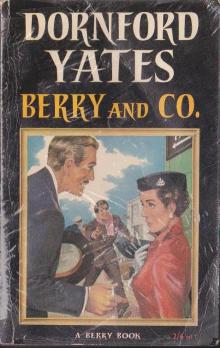 Berry and Co.
Berry and Co.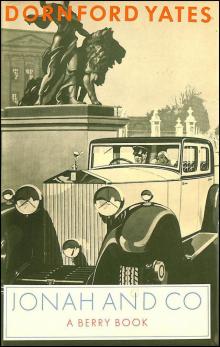 Jonah and Co.
Jonah and Co.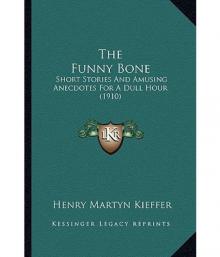 The Funny Bone: Short Stories and Amusing Anecdotes for a Dull Hour
The Funny Bone: Short Stories and Amusing Anecdotes for a Dull Hour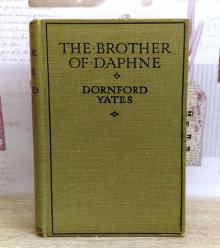 The Brother of Daphne
The Brother of Daphne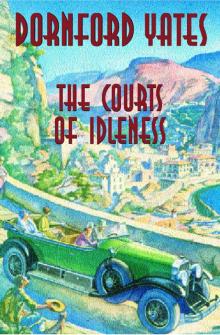 Courts of Idleness
Courts of Idleness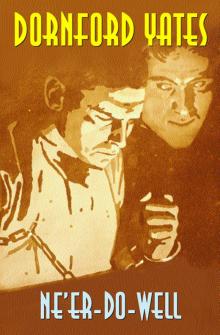 Ne'er Do Well
Ne'er Do Well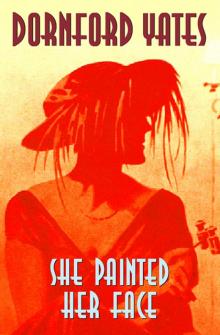 She Painted Her Face
She Painted Her Face Safe Custody and Laughing Bacchante
Safe Custody and Laughing Bacchante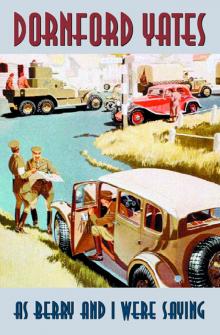 As Berry and I Were Saying
As Berry and I Were Saying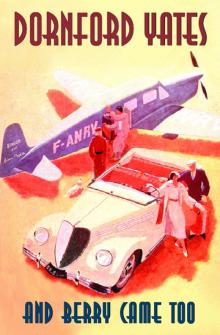 And Berry Came Too
And Berry Came Too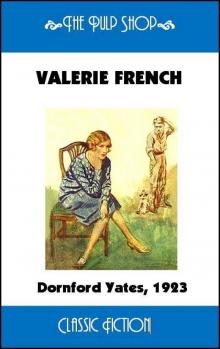 Valerie French (1923)
Valerie French (1923)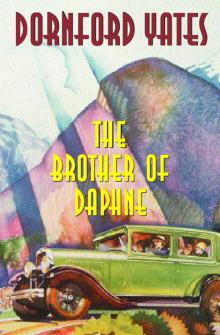 Brother of Daphne
Brother of Daphne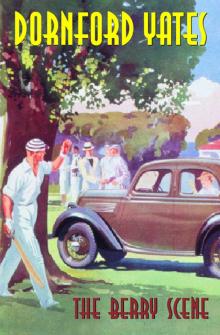 Berry Scene
Berry Scene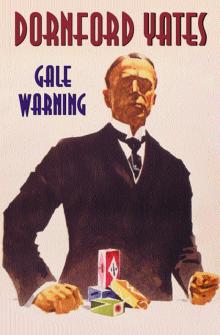 Gale Warning
Gale Warning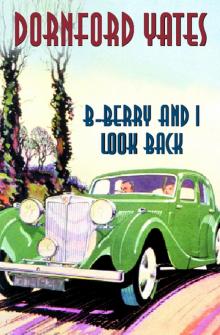 B-Berry and I Look Back
B-Berry and I Look Back Storm Music (1934)
Storm Music (1934)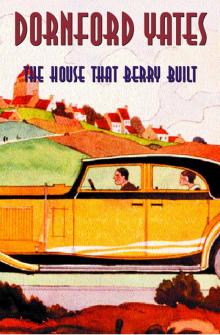 House That Berry Built
House That Berry Built